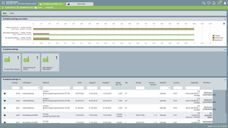
GUS ERP GmbH
ERP solutions for the process industry

About GUS
Pharmaceuticals are becoming increasingly individualized, quality requirements are higher and regulations are numerous: the GUS-OS Suite enables pharmaceutical companies to achieve largely automated and lean production in this environment. Almost 40 years of experience in the pharmaceutical industry have gone into the GUS Group's process-oriented ERP solution. The GUS-OS Suite is currently being used by around 60 pharmaceutical manufacturers, distributors and contract manufacturers. It ensures the planning, production and delivery of high-quality medicines. All business processes are compliant with regulations. And the industry processes supplied as standard can also be modeled individually for each customer.
Due to their dynamic market environment, pharmaceutical companies have to constantly adapt their processes and software. For example, they need improved calculation schemes for external product and service offers, IT applications for tender management or tools for supplier evaluation. The GUS-OS Suite is specially designed for the process industry and offers corresponding functions. In addition, GUS Group consultants work with customers to find answers to other regulatory and business management questions. Always with the aim of optimizing the efficiency and transparency of business processes.
What the pharmaceutical industry needs
The standard version of the GUS-OS Suite already covers a large number of pharma-specific requirements - and takes into account all important regulations such as GAMP 5, GxP and the Serialization Directive 2011/62/EU. The standard functions of the GUS-OS Suite include
• Consistently validation-compliant process control in accordance with GMP and other standards and support for computer system validation
• Audit trail ensures data integrity, traceability and traceability in all process steps
• Business Intelligence (BI) calculates process and financial key figures in real time. On this basis, processes can be optimized quickly and accurately and capacity utilization can be increased
• Digital hub service for data exchange and communication with external partners
• Seamless documentation of batch origin and use
• For quality assurance and development: laboratory
integration in accordance with GLP guidelines and test instructions in accordance with AMWHV §14 and §23
• Traceability matrix (Scope Portal) links specifications/obligations with the risk classification according to GxP guidelines
• Stability tests in accordance with ICH Q1 A-F, GMP guidelines Part I 6.23-33, retained sample management in accordance with AMWHV §18 and §27
• Worldwide shipping in accordance with GDP guidelines
• Support for price moratoriums and statutory discounts
• Integrated serialization process
The companies are members of the GSG GENII Software Group, which offers leading, industry-specific software solutions and services explicitly for medium-sized companies and public administrations. With its industry expertise and personal customer relationships, the group of companies is a trusted partner and expert advisor to its customers. It guides its customers through digitalization and ensures that they are equipped for the future in a volatile environment.
GENII is based in Munich and has around 2,400 employees and a turnover of around 340 million euros. GENII is backed by Bregal Unternehmerkapital and Elvaston.
In addition to our headquarters in Cologne, we also have branches in Munich, Hamburg and St. Gallen in Switzerland.
- Founding: 1980
- Focus : Manufacturer
- Employees: 501-1,000
- Industry : Production technology, IT
Here you will find GUS ERP GmbH
See the theme worlds for related content
Topic world Digitalization in the laboratory
The topic world Digitalization in the lab presents innovations and trends from digital data systems (ELN, LIMS) to laboratory robots and networked devices (IoT) to AI and machine learning.

Topic world Digitalization in the laboratory
The topic world Digitalization in the lab presents innovations and trends from digital data systems (ELN, LIMS) to laboratory robots and networked devices (IoT) to AI and machine learning.


